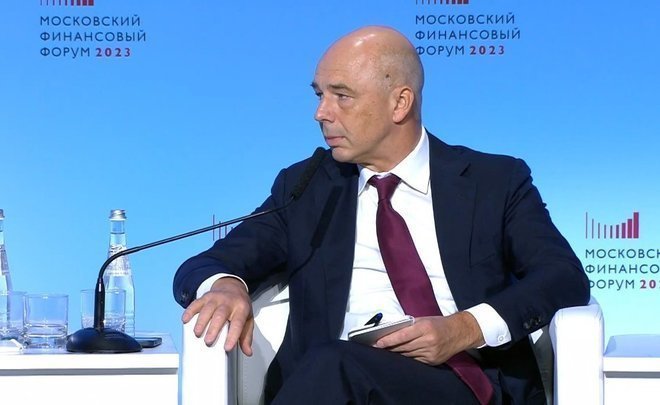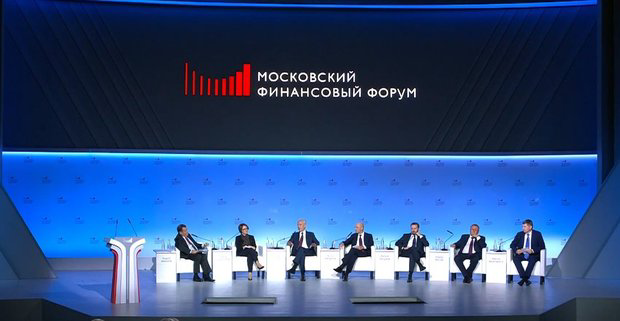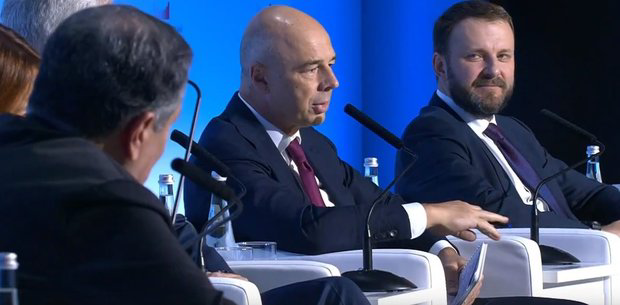Anton Siluanov: ‘Many say when the budget is drawn up: ‘I got half a glass but I’d like a bucket’

The 7th Moscow Financial Forum took place in the Russian capital on 28 September. Its key theme is In Search for a New Balance: Russian Financial and Economic System Amid Global Transformation. Finance Minister Anton Siluanov made statements about the country’s budget. According to him, there will be enough money for Russia’s all planned actions, while the deficit in 2023 won’t be above 2%. Read the politician’s key statements in Realnoe Vremya’s report.
“A normal, healthy budget”
Last week, the Russian government approved a federal budget draft for 2024, 2025 and 2026. Incomes are expected to total 35 trillion rubles next year, while costs will reached 36.6 trillion rubles. In other words, the deficit is forecasted to amount to 1.6 trillion rubles.
When commenting on this, Anton Siluanov claimed that Russia’s budget was healthy and normal. According to him, it shouldn’t rest on forecasts:
“If we are talking about budget cuts, our budget, in contrast, is going forward, growing. Next year’s budget is 36.6 trillion rubles. It is a normal, healthy budget.”
A budget cut isn’t being discussed — the minister said that it is redistributed costs totalling 500 billion rubles.
“There is no sequester. What you call sequester are those costs we annually redistribute for some tasks and priorities,” noted the head of the Ministry of Finance.
He said the budget would do for all planned objectives.
“There is a well-known expression that there is always a lack of money. But there will be enough money for all plans. Yes, clearly, many say when the budget is drawn up: ‘I got half a glass but I’d like a bucket.’ There will be enough money. Money always requires a head and hands no matter how money you have. If there is a good head and hands, less money can be spent,” the minister stressed.
“The deficit won’t exceed our planned parameters”
As for the 2023 budget, as Siluanov noted, the costs will be funded without borrowings in the market.

“This year we see god oil and gas incomes, we will smash our targets in oil and gas incomes. In this respect, it seems to me that it is absolutely economically feasible that we will finance our expenses with oil and gas incomes, not resorting to borrowings in the market and not giving additional stimulus to a rise in rates in the economy,” said the head of the Finance Ministry.
“Due to this, the deficit of the federal budget in 2023 won’t be above 2% of GDP.
“Everything will depend on expenses incurred during the remaining period till the end of the year. The deficit won’t exceed our planned parameters,” he said.
“The budget breakdown shows that the focus on made on securing our victory”
Siluanov named providing the front with all the essentials for Russia’s victory as budget priority. According to him, the share of budget costs in defence and security is growing.
“The budget breakdown shows that the main focus is made on providing our victory — the army, defence, armed forces, soldiers — the budget has everything needed for the front, all the essentials for victory. This is not a small burden for the budget but it is our undoubted priority,” the minister said and noted other areas — both investments in high technologies and social commitments.”
The Russian president’s spokesperson Dmitry Peskov talked about defence expenses on 28 September. The budget draft envisages higher costs in this area.

“Here it is obvious that such a ramp-up is needed, absolutely needed because we are living in an era of a hybrid war. We continue the special military operation. I mean the hybrid war on us. And this requires huge costs,” noted Peskov.
The creation of SWIFT’s alternative to be discussed at BRICS summit in Kazan
Besides the budget, Siluanov touched on the creation of an alternative to SWIFT — an international interbank communications system with over 11,000 biggest organisations in almost all countries of the world.
“We are trying to introduce our financial messaging system, our colleagues, Chinese partners, have their own system. Other BRICS state have it too — the systems are either created or they have their own systems. This is why this issue is a topic for discussion for financial authorities and agencies in BRICS states,” the finance minister said.
According to him, the issue will be raised at the BRICS summit next year Kazan will host,” the finance minister said.